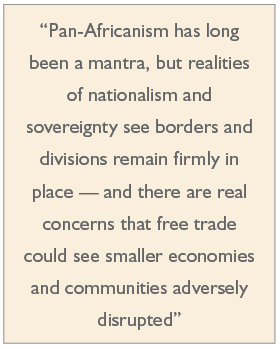On April 2 the Gambia’s parliament wrote itself into modern African history when it ratified the Africa Continental Free Trade Agreement (AfCFTA). It became the 22nd country to do so, pushing the plan across an agreed threshold for it to “come into force”.
This does not mean African countries will be dropping tariff and non-tariff barriers and allowing unhindered trade anytime soon. But it does mean serious negotiation towards that goal can begin.
It is one small step towards the giant leap Africa needs to take to become a significant player in international trade. As is often said of Africa, how can it be a force in the world if its 55 countries cannot even do business among themselves?
The AfCFTA was enacted in Rwanda in March of 2018 and 52 countries quickly signed up. The lure for African leaders was being part of the biggest trade bloc in the world — 1.2 billion people and a potential market of US$3 trillion, according to the World Economic Forum.
Intra-continental trade is less than 20 percent of Africa’s total, while Europe and Asia are at 69 percent and 59 percent respectively. Making it easier for Africans to exchange goods and services with one another will unlock the continent’s economic potential and the AfCFTA — if implemented immediately, with 90 percent of import tariffs removed — would grow Africa’s intra-continental trade to 52 percent by 2022, the African Union says.
With 22 ratifications, the AU’s technocrats have the green light to start sketching out how the Big Idea might work. They must untangle a daunting web of tariffs and regulations between a patchwork of countries, not to mention eight official economic communities.
Sceptics say prospects of realising the vision are dim. After all, smaller, regional free trade pacts have been hard to conclude. The Southern African Development Community (SADC), for example, has been around for a while but its broad trade and economic integration goals remain elusive. The so-called Tripartite Free Trade Area — linking the SADC, Comesa and the EAC — was conceived more recently to much acclaim, but has stalled.

Free trade areas offer many advantages, such as greatly expanded markets for countries and companies, big and small; economic growth, thanks to growing manufacturing sectors, burgeoning small businesses and job creation; attracting more foreign direct investment; and reduced input costs due to cheaper raw material imports and location of production in cheaper centres.
Add in the greater international bargaining power of a single, large bloc over individual small economies and consolidation looks like a no-brainer.
Pan-Africanism has long been a mantra, but realities of nationalism and sovereignty see borders and divisions remain firmly in place. And there are real concerns that free trade could see smaller economies and communities adversely disrupted, even swept away. Africa has wider wealth disparities than any other region of the world, with more than 50 percent of its GDP contributed by Nigeria, South Africa and Egypt. Harmonising economies to create a fair and equitable trading environment will be extremely challenging.
As much as open trade routes help small businesses grow, they threaten those not as competitive as the “invaders”. Localised job losses are feared.
These are among the reasons why the continent’s biggest economy, Nigeria, is the elephant in the room — one of the three countries not to have signed the AfCFTA. The others are Benin and Eritrea.
Ayuba Wabba, Nigeria’s leading trade unionist, describes the AfCFTA as “an extremely dangerous and radioactive neo-liberal policy initiative”.
However, the agreement does offer some comfort to doubters, for example specifically having provision for anti-dumping measures and protection for “infant industry”.
Concerted diplomatic efforts are being made to bring Nigeria around. Its leaders are hearing persuasive arguments about how intra-African trade can turn the tide on the continent’s poverty and dependency.
____________________________
LEX Africa is an alliance of law firms with over 600 lawyers in 24 African countries formed in 1993. More information may be found at www.lexafrica.com.

T: (27) 11 535 8000


